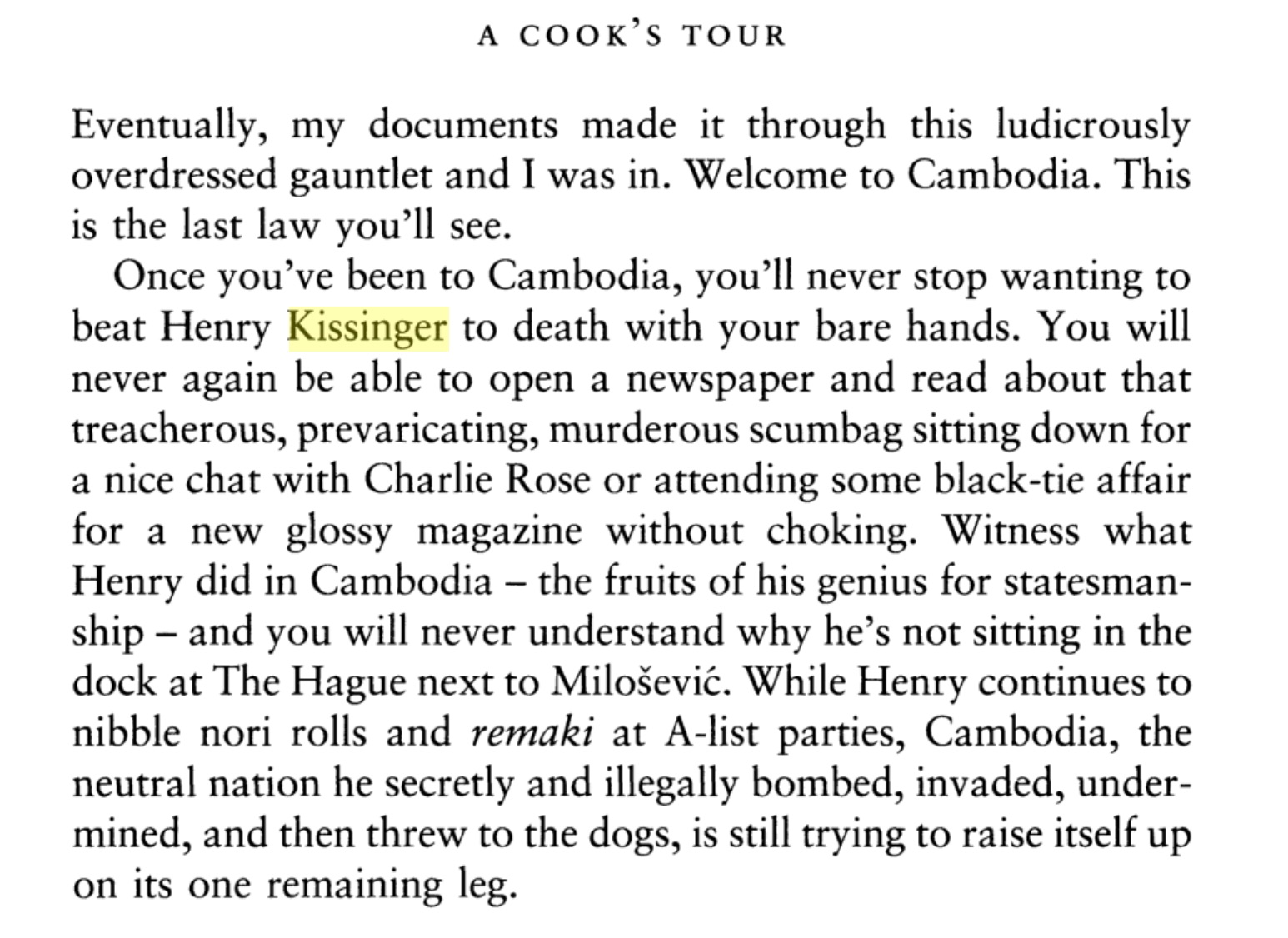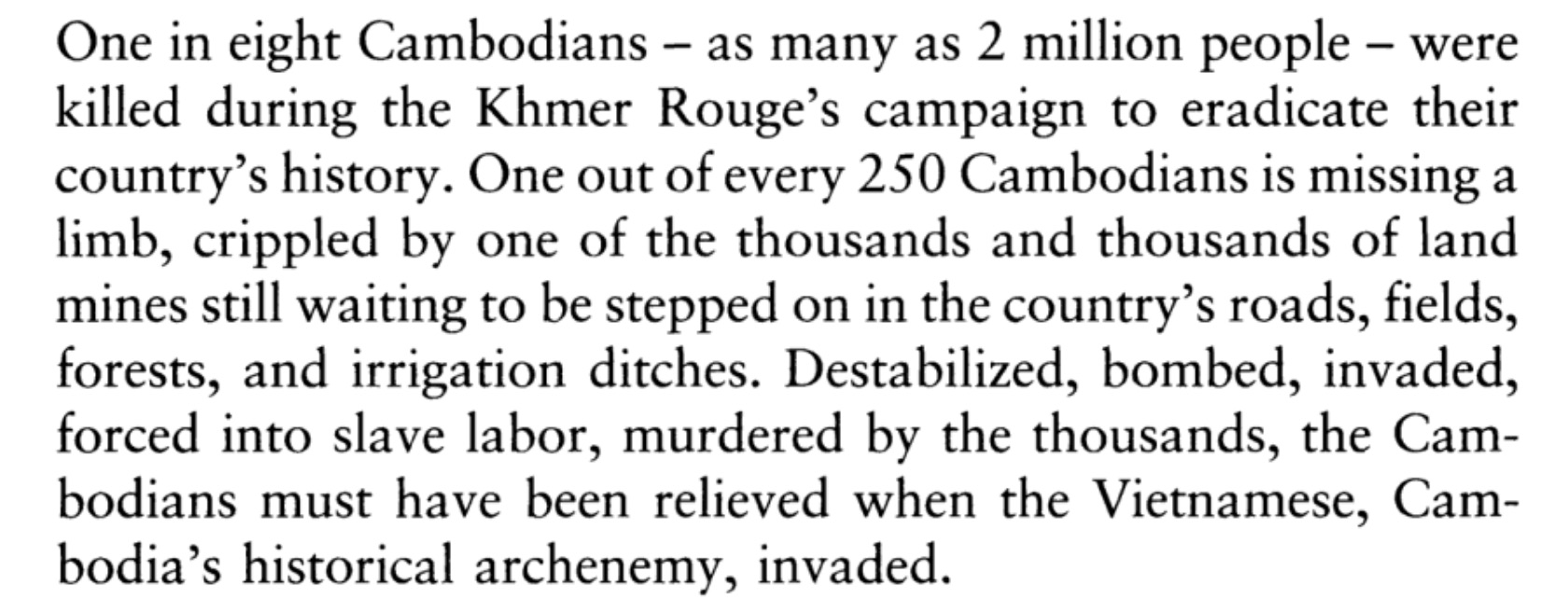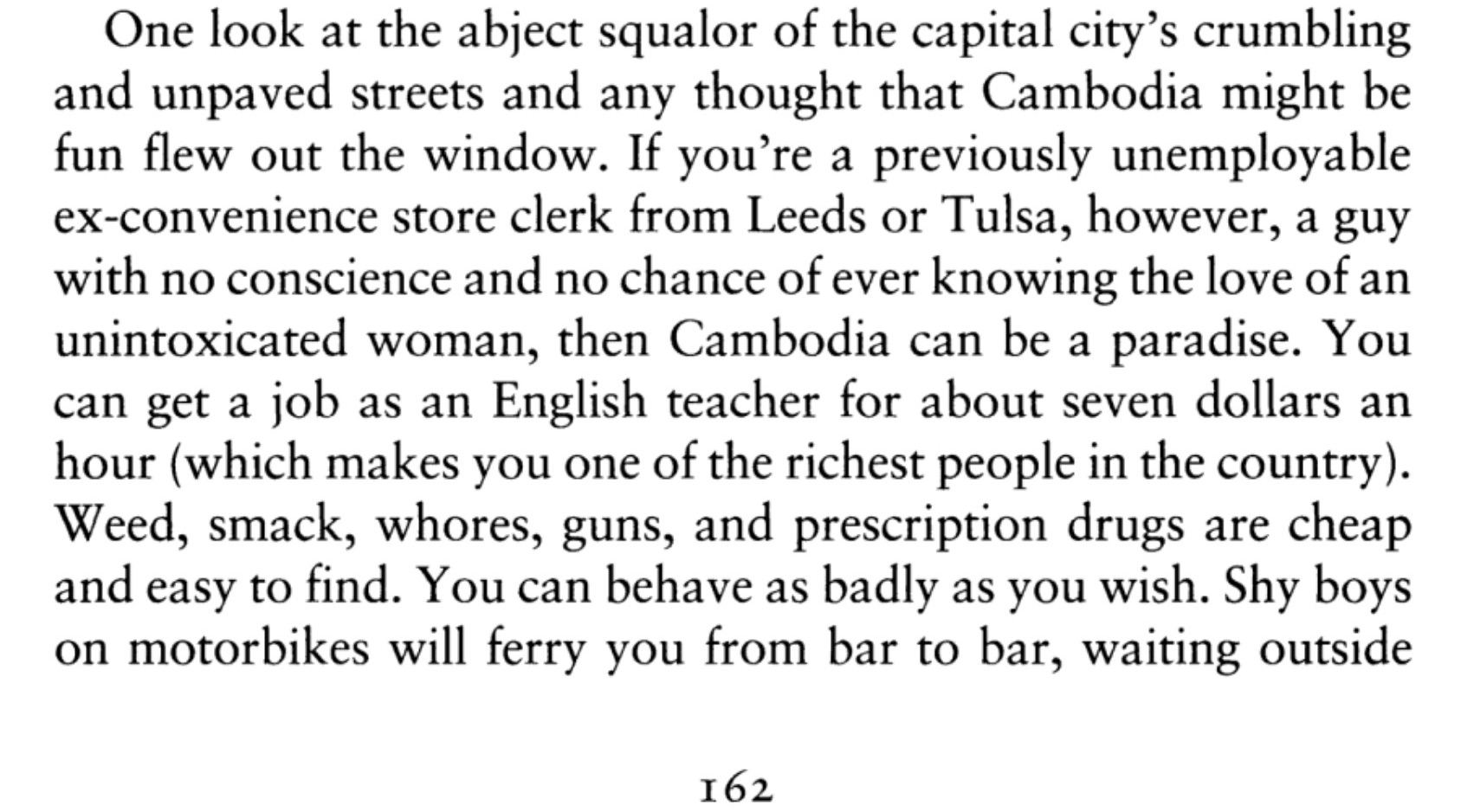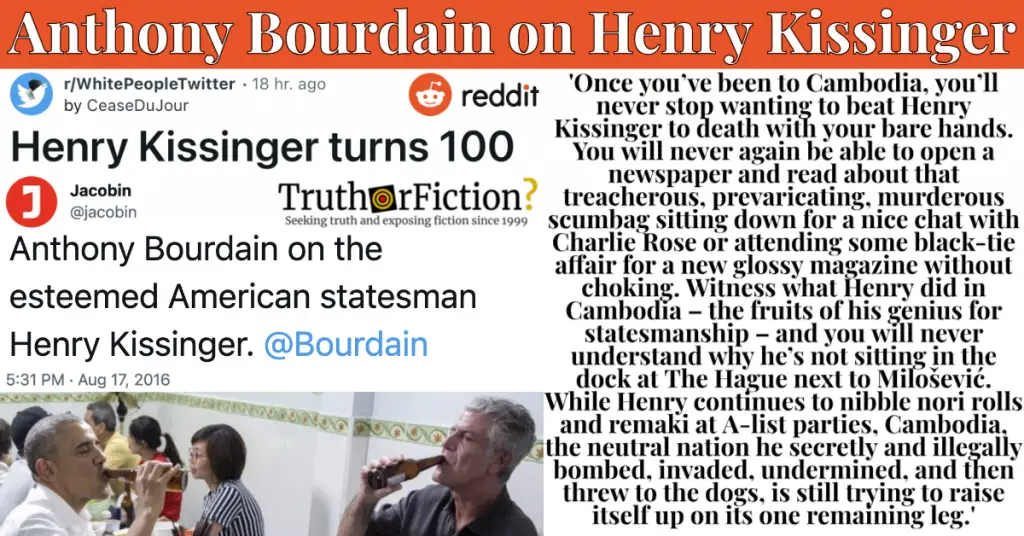On May 26 2023, multiple accounts shared a quote attributed to celebrity chef and travel correspondent Anthony Bourdain, on the topic of former American diplomat Henry Kissinger and his legacy in Cambodia:
A highly popular version of the post appeared on r/WhitePeopleTwitter (“Henry Kissinger turns 100”).
Fact Check
Claim: Anthony Bourdain said: “Once you’ve been to Cambodia, you’ll never stop wanting to beat Henry Kissinger to death with your bare hands.”
Description: This claim refers to a statement allegedly made by celebrity chef and travel correspondent Anthony Bourdain, expressing a strong resentment towards former American diplomat Henry Kissinger, particularly regarding his role in Cambodia.
On May 26 2023, Google Trends data measured “Breakout” levels of search interest for “Anthony Bourdain on Henry Kissinger,” likely due to the post’s popularity on Reddit.
Broadly, the post benefited from context regarding Bourdain, Kissinger, and Cambodia, in addition to validation of the quoted material and attribution to Bourdain.
‘Henry Kissinger Turns 100’
Henry Kissinger served as Secretary of State under President Richard Nixon; May 27 2023 was his 100th birthday.
A Brittanica entry for Kissinger twice mentioned Cambodia in the context of Kissinger’s career:
Kissinger’s reputation as a political scientist led to his role as an adviser to New York governor and Republican presidential aspirant Nelson Rockefeller. In December 1968 Kissinger was appointed by President Nixon as assistant for national security affairs. He eventually came to serve as head of the National Security Council (1969–75) and as secretary of state (September 1973–January 20, 1977).
[…]
Although [Kissinger] originally advocated a hard-line policy in Vietnam and helped engineer the U.S. bombing of Cambodia (1969–70), Kissinger later played a major role in Nixon’s Vietnamization policy—the disengagement of U.S. troops from South Vietnam and their replacement by South Vietnamese forces … During the final days of the Vietnam War, in March 1975, [President Gerald] Ford ordered an airlift of some 237,000 anticommunist Vietnamese refugees from Da Nang, most of whom were taken to the United States. Two months later, after the seizure by Cambodia of the American cargo ship Mayaguez, Ford declared the event an “act of piracy” and sent the Marines to seize the ship. They succeeded, but the rescue operation to save the 39-member crew resulted in the loss of 41 American lives and the wounding of 50 others. Moreover, U.S. relations with Thailand became strained because the U.S. strike had been launched from a base in Thailand against the wishes of the Thai government.
In modern political and historical discourse, Kissinger’s legacy was often in the context of Cambodia. A February 2023 University College London (UCL) lecture, “Henry Kissinger, Cambodia, and the ‘War Criminal’ Charge: From Shawcross to Hitchens,” was promoted with the following blurb:
The charge that Henry Kissinger is a war criminal for his role in the bombing and invasion of Cambodia has persisted since the early 1970s. In 1979, in an influential book titled Sideshow, journalist William Shawcross drew on documents obtained via the Freedom of Information Act to suggest that Kissinger (and Nixon) were partly responsible for the genocide that engulfed Cambodia after 1975. This talk discusses the lasting influence of these and similar charges, including their resurrection by Christopher Hitchens in his 2001 book, The Trial of Henry Kissinger—and charts Kissinger’s vehement reactions and counterattacks. Questions from the audience will follow the talk.
A May 2022 History.com entry, “Henry Kissinger’s Controversial Role in the Vietnam War,” began:
As advisor to President John F. Kennedy, then national security advisor (1969-75) and secretary of state (1973-77) to President Richard Nixon, Henry Kissinger was responsible for making major decisions related to the Vietnam War. [Kissinger] kept the U.S. bombing of Cambodia a secret from Congress, but won the Nobel Prize for negotiating the 1973 Paris Peace Accords that led to a ceasefire. That peace failed two years later.
His flair for secret diplomacy earned him both acclaim and detractors, but the legacy of Vietnam, which he called “a tragic national experience,” haunted him long after the war.
A separate section about Kissinger and Cambodia went into further detail:
Kissinger was deeply involved in the bombing raids on Cambodia—and in keeping them a secret from Congress and the public. According to a Pentagon report released in 1973, “Henry A. Kissinger approved each of the 3,875 Cambodia bombing raids in 1969 and 1970” as well as “the methods for keeping them out of the newspapers.”
By the end of the bombing campaign, nicknamed “Operation Menu,” the U.S. had dropped a total of 110,000 tons of bombs that killed between 150,000 and 500,000 civilians. The Khmer Rouge galvanized anti-American sentiment in a destabilized Cambodia, rising to power and slaughtering 1.7 to 2.2 million Cambodians as part of the Cambodian genocide.
In February 2016, the New York Times published an editorial, “Kissinger Was a Courtier to Atrocity.” It read in part:
Repeatedly crying wolf over Soviet power, obsessed by a black-white view of the world, failing to understand that Communist-led insurgencies like Vietnam’s were crucially nationalist and anticolonial, Kissinger propelled himself simplemindedly into the heights and depths of a career as courtier-in-chief. It culminated in his partnership with Richard Nixon in steering the last six years of America’s Vietnam War — during which more than 21,000 Americans died, along with between 800,000 and 1.5 million Vietnamese.
Under Kissinger’s guidance of an American bombing campaign kept secret from Americans, Cambodia became — according to leading Southeast Asia scholars — “one of the most heavily-bombarded countries in history.” Gravely undermined, the government of Cambodia was overthrown by the genocidal Khmer Rouge. As the by-no-means-left-wing British journalist William Shawcross wrote in noting that Kissinger found no room in his 894-page memoir, “White House Years,” to consider the subsequent fate of Cambodia, “for Kissinger Cambodia was a sideshow, its people expendable in the great game of large nations.” Reviewing Shawcross’s “Sideshow” favorably, Kissinger’s former Harvard colleague and co-teacher, the late Stanley Hoffmann, wrote that “the ordeal inflicted on the Cambodian people by its rulers since April 1975 was not merely preceded but prepared by America’s own atrocious policy.” It was neither morally justifiable nor tactically astute.
A November 2015 Salon.com article addressed the same history, quoting Kissinger as gleefully planning “bombing runs”:
A Pentagon report released in 1973 stated that “Henry A. Kissinger approved each of the 3,875 Cambodia bombing raids in 1969 and 1970” — the most secretive phase of the bombing — “as well as the methods for keeping them out of the newspapers.”
All told, between 1969 and 1973, the U.S. dropped half-a-million tons of bombs on Cambodia alone, killing at least 100,000 civilians. And don’t forget Laos and both North and South Vietnam … In fact, that bombing campaign did have one striking effect: it destabilized Cambodia, provoking a 1970 coup that, in turn, provoked a 1970 American invasion, which only broadened the social base of the insurgency growing in the countryside, leading to escalating U.S. bombing runs that spread to nearly the whole country, devastating it and creating the conditions for the rise to power of the genocidal Khmer Rouge.
Kissinger’s legacy came to brief issue during the 2016 Democratic primaries, when Sen. Bernie Sanders (I-Vermont) asserted that Kissinger was “one of the most destructive secretaries of state in the modern history of this country.” A February 2016 Vox.com piece about Sanders’ remarks ominously added that Americans were “still learning about the full extent of Kissinger’s responsibility for violence around the world.”
Anthony Bourdain in Brief
Anthony Bourdain was a well-known and loved celebrity chef who died in France in 2018.
Bourdain was known for many things, including his love of food, candor, and empathy, and his death was mourned globally. When the news first broke, U.S. President Barack Obama tweeted:
Bourdain received wide recognition in the late 1990s. Bourdain’s Anthony Bourdain: Parts Unknown began airing on CNN in 2013, depicting Bourdain’s travels highlighting global cuisine:
In 1997, The New Yorker published Bourdain’s now famous article “Don’t Eat Before Reading This,” a scathingly honest look at the inner workings of restaurants, specifically their kitchens. With his credibility as a renowned chef, the article carried much weight and led to other writing projects. In 2000, his bestselling book Kitchen Confidential: Adventures in the Culinary Underbelly, a vast expansion of the New Yorker article that highlighted Bourdain’s sometimes rough disposition, came out to great popularity.
[…]
In 2005, Bourdain premiered a new Travel Channel series, Anthony Bourdain: No Reservations, which explored similar themes as A Cook’s Tour. The show ran for nine seasons, ending in 2012, and enjoyed a wide audience while winning two Primetime Emmy Awards for its cinematography … Bourdain returned to series television in 2013 with Anthony Bourdain: Parts Unknown, which again examined specific dining rituals across the globe. The show won four Emmys, with three consecutive wins from 2013-15 for Outstanding Informational Series or Special.
Biography.com described Bourdain’s 1997 article as “scathingly honest,” a descriptor that could easily be applied to Bourdain himself. His name was invoked in the summer of 2021 (amid controversy over pandemic risks to chefs and restaurant workers), and an unverified quote attributed to Bourdain circulated virally in February 2022.
‘Once You’ve Been to Cambodia, You’ll Never Stop Wanting to Beat Henry Kissinger to Death With Your Bare Hands’
On Reddit, the post’s submitter shared the post to mark Kissinger’s looming centenarian birthday, May 27 2023.
A screenshot of an August 2016 tweet by Jacobin magazine was attached to the Reddit post:
The tweet tagged Bourdain and presented a text image as “Anthony Bourdain on the esteemed American statesman Henry Kissinger.” The text on the screenshot read:
Once you’ve been to Cambodia, you’ll never stop wanting to beat Henry Kissinger to death with your bare hands. You will never again be able to open a newspaper and read about that treacherous, prevaricating, murderous scumbag sitting down for a nice chat with Charlie Rose or attending some black-tie affair for a new glossy magazine without choking. Witness what Henry did in Cambodia – the fruits of his genius for statesmanship – and you will never understand why he’s not sitting in the dock at The Hague next to Milošević. While Henry continues to nibble nori rolls and remaki at A-list parties, Cambodia, the neutral nation he secretly and illegally bombed, invaded, undermined, and then threw to the dogs, is still trying to raise itself up on its one remaining leg.
A search for “once you’ve been to Cambodia, you’ll …” led to a quote entry on the sometimes unreliable social reading site Goodreads. That iteration mentioned the name of one of Bourdain’s books, A Cook’s Tour: Global Adventures in Extreme Cuisines.
Using Google Books, we searched for the word “Kissinger” in Bourdain’s A Cook’s Tour: Global Adventures in Extreme Cuisines. A match appeared on page 162 of the book, and the following screenshots feature the quote (and Bourdain’s unique voice) in a broader context:



Summary
On May 26 2023 (the eve of Henry Kissinger’s 100th birthday), a Reddit account was one of many quoting Anthony Bourdain on Henry Kissinger as once having said or written: “Once you’ve been to Cambodia, you’ll never stop wanting to beat Henry Kissinger to death with your bare hands.” That quote originated with Bourdain’s 2010 book A Cook’s Tour: Global Adventures in Extreme Cuisines. Kissinger’s role in destabilizing Cambodia was well documented, and the quote was correctly attributed to the late Anthony Bourdain.
- Anthony Bourdain: "Once you've been to Cambodia, you'll never stop wanting to beat Henry Kissinger to death with your bare hands." | Reddit
- Anthony Bourdain on Henry Kissinger | Google Trends
- Anthony Bourdain: "Once you've been to Cambodia, you'll never stop wanting to beat Henry Kissinger to death with your bare hands." | Twitter
- Henry Kissinger | Brittanica
- Henry Kissinger, Cambodia, and the “War Criminal” Charge: From Shawcross to Hitchens | UCL
- Henry Kissinger’s Controversial Role in the Vietnam War
- Kissinger Was a Courtier to Atrocity
- Henry Kissinger's genocidal legacy: Vietnam, Cambodia and the birth of American militarism
- Bernie Sanders is right: Hillary Clinton praising Henry Kissinger is outrageous
- “Low plastic stool, cheap but delicious noodles, cold Hanoi beer.” This is how I’ll remember Tony. He taught us about food — but more importantly, about its ability to bring us together. To make us a little less afraid of the unknown. We’ll miss him. | Barack Obama/Twitter
- Were Cooks the Largest Occupational Group to Die in the Pandemic?
- Anthony Bourdain: ‘Eat at a Local Restaurant Tonight’ Quote
- Anthony Bourdain | Biography.com
- Anthony Bourdain on the esteemed American statesman Henry Kissinger. @Bourdain | Jacobin/Twitter
- Once you’ve been to Cambodia, you’ll never stop wanting to beat Henry Kissinger to death with your bare hands | Anthony Bourdain, A Cook's Tour: Global Adventures in Extreme Cuisines | Goodreads
- Once you’ve been to Cambodia, you’ll never stop wanting to beat Henry Kissinger to death with your bare hands | Anthony Bourdain, A Cook's Tour: Global Adventures in Extreme Cuisines | Google Books

